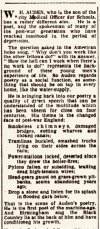PAUL ELLISON HUNTER
New Member
I had been in contact with Solihull Local Studies regarding Auden’s association with Solihull and the particular investigation below. They have recommended me to contact you, so here is my query.
One particular interest of mine is the poem “As I walked out one evening”. Trying to trace the route just brought confusion. Was he walking towards Birmingham centre or any from it? Where was the railway arch - as far as I know, there’s no railway that crossed Bristol Street and never was? Maybe in Digbeth. If the “brimming river” is the Rea, it crosses Bristol Road well to the south of the city and then parallels it. I notice that, late in the evening, Auden returns to the river, notices the clocks have stopped chiming and the lovers are gone - but the railway arch gets no second mention…
Maunderings of a septuagenarian. But please do let me know anything that you can.
Best wishes (from Sheffield).
David Stead
One particular interest of mine is the poem “As I walked out one evening”. Trying to trace the route just brought confusion. Was he walking towards Birmingham centre or any from it? Where was the railway arch - as far as I know, there’s no railway that crossed Bristol Street and never was? Maybe in Digbeth. If the “brimming river” is the Rea, it crosses Bristol Road well to the south of the city and then parallels it. I notice that, late in the evening, Auden returns to the river, notices the clocks have stopped chiming and the lovers are gone - but the railway arch gets no second mention…
Maunderings of a septuagenarian. But please do let me know anything that you can.
Best wishes (from Sheffield).
David Stead



